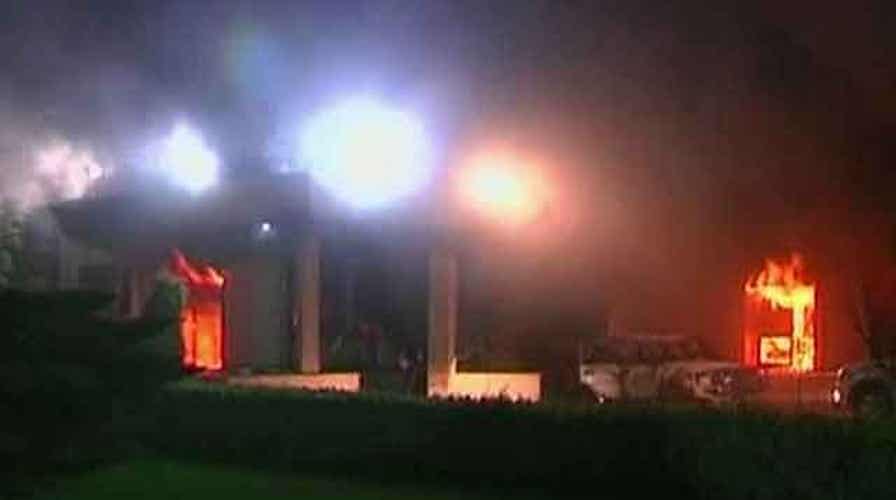State Department: Clinton will testify on Benghazi
Secretary of state returns to work after health scare
A decision by a Tunisian judge to conditionally release one of the very few people in custody in connection with the Libya terror attack has underscored concerns in Washington about the alleged lack of progress in the investigation nearly four months after the attack.
"The window for justice is quickly closing as far as I see," Rep. Ted Poe, R-Texas, a member of the House Foreign Affairs Committee, told FoxNews.com Tuesday.
While a Senate committee and State Department-sponsored panel have both issued reports in recent weeks about the Sept. 11 attack that killed four Americans, those reports said little about the criminal investigation itself. They examined the motivations and conditions that led to the attack, but not who was specifically behind it. Further, Capitol Hill lawmakers are still in a holding pattern as they wait to hear testimony from Secretary of State Hillary Clinton, who is recovering from a blood clot and has pledged to testify.
The criminal investigation itself falls to the FBI, and the decision in Tunisia appeared to be a blow to the case.
A lawyer for Ali Harzi, a 26-year-old Tunisian, said the presiding judge had "conditionally freed" his client Monday night and he has to remain in the greater Tunis area in case the court needs him. The lawyer described the release as "correcting an irregular situation" because authorities never had any real evidence.
A spokeswoman for the FBI told FoxNews.com on Tuesday that the investigation is ongoing, without commenting on the Tunisian judge's decision.
"The FBI continues to pursue all investigative leads into the deaths of the four Americans who were killed in Benghazi on Tuesday, Sept. 11, 2012," the spokeswoman said in an email.
Rep. Frank Wolf, R-Va., said in a statement that he's "very disappointed" in the decision out of Tunisia.
"I have every reason to believe that Harzi was involved in the attack," he said. "Now Harzi walks the streets of Tunisia a free man -- facing no consequence for his role in the Benghazi attack." Wolf previously called for a cutoff in U.S. aid to Tunisia.
Poe, among the lawmakers who has raised concern about diplomatic security abroad, could not say what level of involvement Harzi may have had. But he said he is "certainly concerned that after (four months) our government hasn't captured anybody responsible for the attack on our ambassador."
"It seems to me like we should have had more suspects in custody by now," he said.
Last month, House Intelligence Committee Chairman Mike Rogers, R-Mich., also complained about the "near total lack of progress in bringing these terrorists to justice."
Harzi was originally detained in Turkey and in October was extradited to Tunisia, where authorities had said he was "strongly suspected" of being involved in the attack. His lawyer said he was officially charged with "membership of a terrorist organization" -- a charge punishable by six to 12 years in prison.
In December, FBI officials questioned Harzi for three hours in the presence of a Tunisian judge.
U.S. officials also said in December that Egypt had arrested a member of the Islamic Jihad group for possible links to the attack, but in general they lamented a lack of cooperation from local governments in their investigation and said most suspects remained free.
An intelligence source told Fox News last month that beyond the suspects in Tunisia and Egypt, "multiple" suspects were in custody in connection with the attack -- but U.S. access to them had been denied.
Even access to Harzi was delayed at first. Poe acknowledged that a big part of the problem is the "lack of urgency on the part of other governments to help find the suspects."
But he said the U.S. needs to press these countries -- Libya, Egypt, Tunisia and others -- to cooperate, while pursuing an "independent investigation" to whatever extent possible.
U.S. intelligence has blamed the Benghazi attack on militants who are members of a number of different groups. They range from the local Libyan militia Ansar al-Shariah, whose members were seen at the U.S. Consulate during the attack, to militants with links to Al Qaeda in the Islamic Maghreb -- Al Qaeda's leading representative in the African region. The consulate's cameras captured many of the faces of armed men in a mob, and some have been questioned, but most remain free.
In a recent TV interview, Harzi's father, Tahar, said his son was just working in Libya in construction supporting his family.
Both Ali and his brother, Brahim, have had brushes with the law before, however. In 2005 the two were sentenced to 30 months in prison for having contact with another brother, Tarek, who fought against coalition forces in Iraq, according to lawyer Oued-Ali.
The father acknowledged that he had encouraged his sons to take up "jihad in the cause of God."
FoxNews.com's Judson Berger and The Associated Press contributed to this report.





